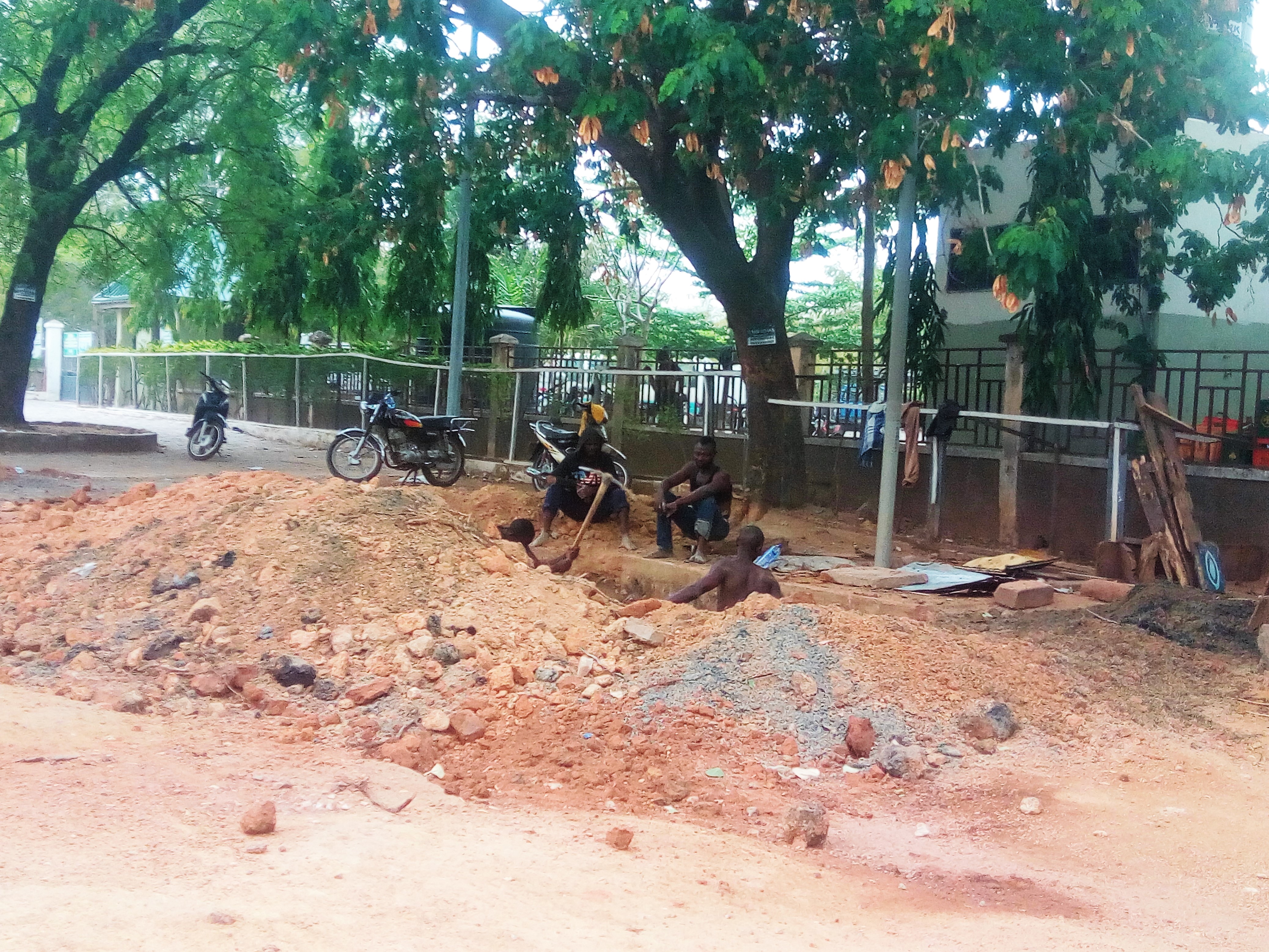An undersized septic tank that has, for more than a year, been a subject of public outcry against the Upper East Regional Health Directorate for posing threats and discomfort to people with a recurrent overflow of human waste is now under reconstruction.
Work started Friday, March 23, 2018 to expand the holding tank less than a week after Starr News had reported that a spillover of semi-solid waste persistently flowing from the premises of the directorate had reached a tipping point.
The exact size of the ‘annoying’ cesspit is unknown, but all —including the health directorate— agree that the hole is too dwarf to sufficiently accommodate pressure coming from waste generated especially from an opened-to-the-public canteen and a drivers’ lounge inside the directorate’s yard.
The Upper East Regional Director of Health, Dr. Wilfred Ofosu, who took over office not too long ago, had told Starr News exactly a week ago that an action was going to be taken this week on the defective cesspool.
“They have made the estimate and brought it. This coming week we’ll expand it. We are going to expand it. We’ll get people to dig an extended area and do a new one so that it won’t overflow again. That’s what we’ are going to do,” he had assured.
It is not certain yet when the reconstruction will be completed. But it is certain that when it is done, emptying of the tank will no longer be as frequent as it has been for several months and the mind-boggling stench that has always compelled people to hold handkerchiefs to their noses whilst eating at nearby food joints also will cease.
Residents commend Director; cry over dysfunctional toilets at Ministries Area
Although the expansion work on the septic tank has just started, some residents already are patting the new regional director on the back for delivering on his promise.
“Well, he said that he would swing into action this week, and he has started it. This shows he means business and that he knows what he’s about in that office. This is a director who came to office recently and has not settled down, yet he’s being quick to patch up lapses.
“We all know the serious inconvenience the septic tank was causing to people. We are not going to perceive that bad smell or see that cholera green water from the septic tank any longer. He deserves some applause for solving a problem he came and met. But once the work (the septic tank reconstruction) has started, it should only be completed in no time,” remarked Sylvester Yin, a resident of Bolgatanga, the regional capital.
The septic tank trouble took the lid off a general sanitation concern some workers at the Ministries Area, the location where the regional health directorate has its administrative block, had often wished to express for redress.
“I saw labourers this morning working at the site to enlarge the cesspit. That is refreshing. But we also want to ask ourselves about the civil servants and the NGO workers who are compelled to defecate in the bushes around day and night because about 100% of the toilets at the ministries, agencies and departments have been out of use for many, many years.
“Generally, we have a serious sanitation crisis in this region. I don’t know how many cholera cases were recorded last year or in 2016 in Upper East; but I remember that 289 cholera cases were recorded in 2014 in this region. Stakeholders in this region need to be more serious than they are about sanitation,” George Gariba, another resident, told Starr News on Friday.
Calls dominate Week for better Access to Water and Sanitation facilities
The peak of the public clamour for “the smell and the cholera liquid” coming from the health directorate’s premises to be tackled coincided with a call by civil society organisations, as the region marked the World Water Day this week, for duty bearers to help improve access to water and sanitation facilities at health stations in rural areas.
“Investing in WASH (water, sanitation and hygiene) is one of the surest ways to help attain the Sustainable Development Goals (SDGs) related to maternal health, water, sanitation and hygiene as well as national policy frameworks. The World Health Organisation (WHO) estimates that 38% of healthcare facilities in low and middle-income countries lack access to a basic water source.
“19% do not have adequate sanitation, and 35% do not have soap for hand-washing. In sub-Saharan Africa, 42% of healthcare facilities do not have access to a basic water source,” said Awal Ahmed Kariama, Executive Director of the Rural Initiatives for Self-Empowerment (RISE) Ghana, in a press release issued in the region this week.
The RISE-Ghana’s Executive Director further urged: “Let us rally local support and buy-in on this important day of World Water Day to mobilise resources, support and equip health centres with WASH facilities, champion hygiene behaviour change in our homes and in healthcare facilities, integrate WASH into district assembly plans and engage policymakers to provide access to WASH in healthcare facilities to prevent needless and preventable deaths resulting from infections.”
Source: Ghana/Starrfmonline.com/103.5FM/Edward Adeti




